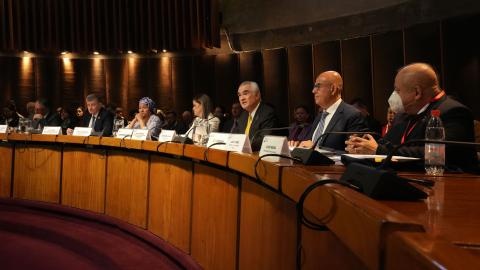Announcement
The stock of infrastructure and access to it remains insufficient in Latin America and the Caribbean. To correct this situation, ECLAC proposes creating public-private alliances for its financing, construction and operation, along with improvements to regulatory frameworks, in its study Productive Development in Open Economies, presented to the region's governments this week, at its Thirtieth Session, in San Juan, Puerto Rico.
According to ECLAC, in the coming years the demand for these services will increase significantly, raising the need to design policies and mechanisms to stimulate public and private investment in this area.
To grow 3% annually from 2000 to 2010, about US$70 billion, or 3% of GDP, should be invested annually. The energy sectors and highways require the most resources.
During the 1990s, the infrastructure service sector in Latin America underwent profound transformations in telecommunications, energy, transportation and sanitary services. In most countries state monopolies ended and participation by private agents was encouraged.
Between 1991 and 2002, telecommunications posted significant growth: total fixed lines averaged annual growth of 10.4%, while mobile telephones went from 300,000 to 100 million. In 1996-2002 Internet users grew almost 30-fold, from 1.49 million to 43.3 million.
The electric power industry's installed capacity rose after privatization of state companies. But the new investors that entered the sector did not increase competition, ECLAC notes, since this was limited and often hampered by concentration and the dominant position of some companies.
Despite expansion, drinking water supply and sewage treatment services still do not cover large segments of the population. Drinking water service coverage is estimated to have reached from 20% to 90% of inhabitants, depending on the country. Just 49% of the region's population is connected to conventional sewage systems.
Reforms also generated competition in ports and increased countries' competitiveness. Today, Argentina, Bolivia, Brazil, Chile, Colombia, Cuba, Mexico, Panama, Paraguay and Uruguay have privately owned ports. In general, the countries with the most reforms can show plentiful investment and efficiency gains.
Investment in infrastructure requires significant public and private efforts. From the perspective of public investment, ECLAC proposes that the management of fiscal accounts should be made more flexible, by improving fiscal and budgetary monitoring instruments and treating capital expenditures differently from operating ones, so the way that investment enters the books does not inhibit rational economic decision-making. One way to introduce more flexibility and promoting growth-oriented fiscal policy is to exclude those investments that generate an income flow with suitable rates of return from public expenditure calculations, in agreements with international bodies. Another way is to strengthen the mechanisms that encourage different types of public-private joint ventures. A third way has to do with the role of multilateral development banks. Financing from these banks should be included in the public budget as governments start amortizing these loans and not when they receive them.
The private sector's involvement in providing infrastructure services has made criteria and mechanisms for setting tariffs one of the main regulatory challenges. Weakness in this sense has meant that productivity increases in infrastructure service provision have not brought an equivalent reduction in their tariffs.
Regional Integration
ECLAC considers regional integration essential to attract investment, as well as increasing productivity, generating jobs and diversifying exports. Multiplying trade in favour of geographic proximity raises issues of physical, social and cultural integration that underline the region's strategic importance.
The UN commission sustains that to overcome the embryonic state of agreements at the moment, countries must expand trade integration, eliminating current hurdles and making trade in services easier. To do so, customs operations should be improved through reforms and modernization, along with the application of a common customs code.
From this perspective, regional cooperation involves major challenges in terms of infrastructure and sustainable development in Latin America and the Caribbean, particularly in the case of transportation, a major pillar of physical integration, and tourism.
*** Chart: Infrastructure Stock ***

